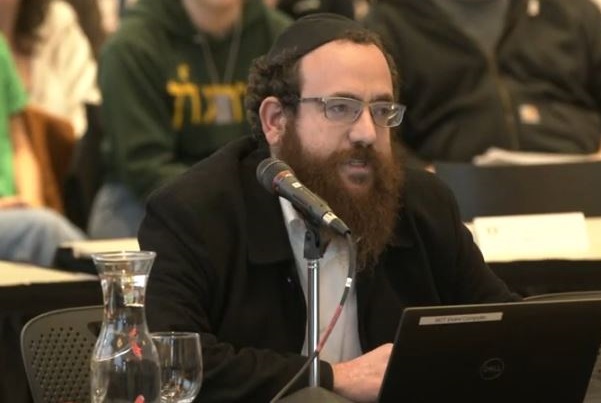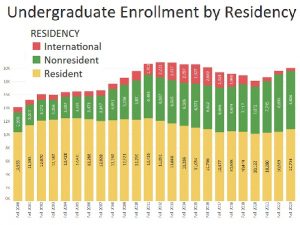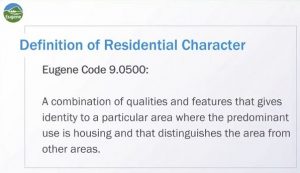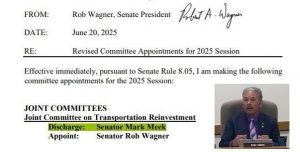Jewish students, Rabbi Berel address UO Board of Trustees
13 min read
UO President Karl Scholz: We recognize this period has been especially painful for some of our Jewish students, colleagues, and parents.
John Q: That’s UO President Karl Scholz, speaking at the Board of Trustees June 4. Here’s a recap of public comments by Jewish students and Rabbi Berel at Board of Trustee meetings March 12 and June 4.
Talia Cordova (March 12, 2024): My name is Talia and I’m a Family and Human Services student here at the University of Oregon. I stand by the calls to implement the Boycott Divestment and Sanctions (BDS) movement that my peers have outlined and I want to emphasize the historical and contemporary basis for this movement.
[00:00:33] Divesting university endowments from entities that perpetuate oppression is a well-precedented strategy for promoting civil rights and justice.
[00:00:40] As a result of student campaigns in the ‘70s and ‘80s which called upon trustees to evaluate the relationship between investment and international subjugation, 55 universities divested from corporations that funded South African apartheid.
[00:00:53] Further, according to the Board of Trustees’ own investment strategy, the UO encourages its advisors and managers to include environmental and social factors in their analytic processes to identify risks.
[00:01:04] Continued investment in corporations that desecrate human life and the earth to build weapons and surveillance technology is an enormous social and environmental risk to the members of our global and campus communities.
[00:01:16] In 2018, when ASUO attempted to pass a resolution, many opponents of BDS leveraged accusations of antisemitism against the movement. This time around, myself and my community insist on making it known that we, as Jewish students, do not unanimously and unconditionally support investment in Israel. We are not a monolith.
[00:01:36] A similar rhetoric begins to stir on campus again. I caution you against accepting the assertion that genocidal investments in our names keep us or anyone safe. Our safety as Jews is inextricable from the safety of Palestinians.
[00:01:49] Placing economic pressure on an entity that is violating international law is a legitimate and well-precedented strategy and it is backed by cross-coalition interfaith support.
[00:02:00] As public officials who hold a fiduciary responsibility for the university, we call on you to use your positions of power to ensure that the foundation divests from violence and invests in our futures.
[00:02:10] Romie Avivi Stuhl (March 12, 2024): My name is Romie Avivi Stuhl and I’m a Jewish Israeli immigrant. In Israel, I lived by the Gaza border, and during periods of unrest, had rockets aimed at my neighborhood by Hamas terrorists.
[00:02:24] Even through the fear and violence I lived through, I always strived to connect with people that had different ideas, build empathy, and truly believed that one day Israelis and Palestinians will live in peace.
[00:02:36] But nothing prepared me for Oct. 7 or the many months that have since followed. On Oct. 6, I was on the coast with some close Israeli family friends who came to visit. Our relaxing night quickly turned to stress and disbelief as we heard of the news back home.
[00:02:52] Our friend Vered was stuck in her shelter room for over 12 hours as she heard gunshots outside of her window and terrorists screaming. We worried for her safety as we heard of people getting kidnapped and beheaded, but Vered was one of the lucky ones.
[00:03:07] On the following days I struggled to focus on my schoolwork but felt a great sense of community as over 100 people came together outside of EMU for the vigil we held. However, the support from the non-Jewish community quickly disappeared. Within days, protests erupted outside the EMU, and suddenly I saw my friends, classmates, and GEs (graduate employees) calling ‘from the river to the sea,’ a clear call for the destruction of the state of Israel.
[00:03:32] With time, these chants became more violent, with the most recent protests inside the EMU, which I had once considered a safe space, calling for an intifada, an armed uprising aimed at the destruction of Israel and killing of all of its citizens.
[00:03:46] As a Jewish and Israeli immigrant at this university, I feel that the administration has left me behind and I worry for my safety and that of my Jewish friends and classmates.
[00:03:56] I refuse to believe that speech directly calling for violence against a people can remain protected in this institution. And I sincerely beg of you to prioritize the safety of your students of all backgrounds. Truly, it is the least you could do.
[00:04:11] Daniel (March 12, 2024): My name is Daniel and I’m a Jewish student here on campus. I’m here to share my experience as a member of the Jewish community. With the tragic events that transpired on Oct. 7, the global Jewish community experienced deep grief. And for the Jewish students here in Eugene, it was no different. As a Jewish community, we came together and we thought other non-Jewish students would be here for us in this time of deep grief.
[00:04:37] For many students on campus, this was the case. They were able to have sympathy towards the Jewish community. However, the support is oftentimes more silent and drowned out by the efforts of students who celebrated the events of Oct. 7, which has effectively alienated members of the Jewish community, causing members to be scared to be Jewish on campus. Chants openly calling for the erasure of the Jewish people in Israel causes me and others to feel uncomfortable on campus.
[00:05:07] Being disrupted in class and all around campus by these chants serves as a constant reminder that people will continue to hate us for being Jewish.
[00:05:17] Over the past few months, I’ve come to the conclusion that no matter what I do or say, I will be hated for the fact that I am Jewish and believe that people globally should be able to protect themselves from terrorist organizations.
[00:05:31] Luckily, I will graduate in the next couple of months and will no longer have to tolerate the blatant antisemitism on campus. However, I worry for my fellow underclassmen who may feel ashamed to speak up or even be Jewish.
[00:05:46] I hope that we will eventually get to a point that they will no longer feel this way and the only way we can get there is if there’s public support of the Jewish community and zero tolerance towards efforts made to make Jewish students feel unsafe.
[00:06:01] President Scholz, I hope that you will hear our voices and stop equating our struggles with other groups because our struggle is very unique right now and needs to be addressed.
[00:06:12] Rabbi Berel Gurevitch (March 12, 2024): My name is Rabbi Berel from Chabad at UO. I’m not here to discuss the conflict or the connection of the Jewish people to the biblical homeland. This is a school of higher education and it’s below our dignity. It’s also obvious that framing the argument as if people that are supportive of Israel are into dead babies is just a lie.
[00:06:32] And the reason I’m here today is just to discuss. I represent many Jewish students that are scared to come here today to talk. They have a lot to say on this topic and they’re walking around campus on eggshells.
[00:06:47] Every student, whatever their beliefs are, have a right to feel safe. Students come to school to study and they should be protected so they can focus on their studies, develop as a person and become a contributor to society.
[00:07:00] And it’s the job of the university to protect our students. I’d like to thank the members that, you know, with this board of taking the issue of antisemitism seriously. Thank you for making time and effort to find ways to protect our students from all forms of hate and harassment, whether emotional or physical. Thank you very much. I pray for a time of real peace and better times ahead.
[00:07:24] Rayna Davis (March 12, 2024): My name is Rayna Davis and I stand before you today as a senior at our university, but more importantly as a proud Jewish student. Reflecting on my journey as a Jewish student on this campus, I must acknowledge the challenges that I and many others like me have faced.
[00:07:37] My freshman year began with an incident where my mezuzah, a cherished symbol of my faith, was torn off my doorpost. Despite my hopes for actions and support from the university, I was disheartened to learn that this act was not deemed a religious hate crime, leaving me feeling vulnerable and overlooked.
[00:07:53] Sadly, this experience is not isolated. The atmosphere on campus became increasingly tense, particularly after Oct. 7, when protests erupted, notably the takeover of the EMU. The EMU, once a place where I felt safe to study and socialize, transformed into a place of hostility. I witnessed fellow students, both familiar faces and strangers, advocating for violence against Israelis and Jews, spewing slogans like ‘from the river to the sea’ and ‘intifada,’ which regardless of your personal views on the conflict, are calls for violence against the Jewish people and Israelis.
[00:08:24] I was as disappointed and disturbed to hear these violent and inappropriate phases chanted in a space where there are rules and policies against gatherings of this sort, and even more disappointed that the university chose not to enforce them.
[00:08:37] The lack of enforcement of the rule that all students are required to follow and the impact that it had and will have on a minority group leaves me with little faith that the university will do what it needs to do to protect our safety if matters get worse.
[00:08:49] The EMU now evokes feelings of unease and exclusion. It pains me to say that I no longer feel entirely welcome in a space that was once integral to my university experience.
[00:08:59] As a proud Jew, I refuse to hide or apologize for my identity. Yet it becomes increasingly difficult to navigate campus life when confronted with calls for the destruction of my people in classes and around campus from fellow students, graduate students, and professors.
[00:09:12] I stand here today not only to share my experience, but to urge the university to take meaningful action. Every student deserves to feel safe and respected in our campus, regardless of their background, beliefs, or identity. It’s imperative that the university prioritizes the well-being of all of its students and fosters the environment of inclusivity.
[00:09:29] As we move forward, I employ the Board of Trustees to consider concrete steps to address these issues, whether through enhanced security measures, educational initiatives, promoting cultural understanding, or robust support services for marginalized community.
[00:09:42] Together, we can create a campus where every student feels valued and empowered to embrace their identity without fear. Thank you for your attention and consideration. I hope we can work together to ensure a brighter and more inclusive future for our university community.
[00:09:54] Rachel Stern (June 4, 2024): My name is Rachel Stern and I am a graduating senior here at UO. I came here in 2020, and throughout my time here, I have become incredibly disappointed in the leadership of this university. As a queer Jewish person of color, I cannot imagine staying in this state after graduating because of the experiences I had at this university.
[00:10:14] Time and time again, I have watched all of you ignore the wishes of the student population. It has become incredibly clear to everyone here that you only care about your own privatization. Even more than that, you prioritize your own wealth. I have lost any ability, faith in your ability to make this university a more ethical place. In many ways this is true, but it has never been more obvious than now, in the face of our continued calls for disclosure and divestment.
[00:10:40] Steve Holwerda, I would like to address you directly. You act as a chair of the Board of Trustees here, and also hold a position as the managing director at Ferguson Wellman Capital Management, which controls over $8 billion in assets.
[00:10:53] Your management firm continues to hold stock in many BDS offenders and recently decided to invest heavily in Nvidia stock. Nvidia is an AI research group that does huge amounts of global computing work and AI program development. Many ethical questions surround investing in AI as a practice, but that’s not what I’m here for.
[00:11:13] Nvidia has a huge research center in Tel Aviv, which continues to invest heavily in the country’s AI development project in May 2023 Nvidia announced they would invest millions of dollars into building an Israeli AI supercomputer named Israel-1.
[00:11:29] While this investment into an Israeli institution during an ongoing genocide is already horrific, it is especially offensive because of Israel’s continued known use of Lavender AI and the ‘Where’s Daddy’ program. These AI algorithms monitor citizens of Gaza to find potential Hamas affiliates. When the IS system finds a target, an IDF member only verifies it for about 20 seconds, despite its high margin of error.
[00:11:53] This system particularly targets families when they are all at home and tends to use dumb bombs because they don’t want to waste the good ones. The IDF sees Palestinians as entirely extendable and you have chosen to endorse that.
[00:12:06] Talia Cordova (June 4, 2024): My name is Talia Cordova, and I’m a proud Jewish student here at UO. Over the past few months, the UO administration has repeated that the university and its foundation must function as politically neutral entities and therefore cannot participate in the historically precedented action of divestment from unethical corporations.
[00:12:27] Not only does this claim disregard the historical role of universities as key players in the development of international political consciousness and pressure, it misconstrues the foundation’s current position as a neutral one. There is no neutrality in genocide.
[00:12:44] The University of Oregon Foundation is actively invested in Jasper Ridge Partners, which is actively funneling funds into a pool that allows defense contractors to actively supply Israel with the tools to carry out genocide in Palestine.
[00:12:58] Maintenance of the political status quo is a political act. There are no universities left in Gaza. More than 80% of schools are damaged or destroyed alongside years of rich scholarship and cultural knowledge. No Gazan student has attended school since Nov. 6, when the Ministry of Education was forced to suspend the school year due to indiscriminate and unrelenting shelling of residential areas.
[00:13:22] As members of a university community, we all understand that education, the free and unfettered exchange of knowledge and ideas, is a universal human right. We call on you to reject the notion that the financial gain of the institution may justifiably come at the cost of the lives and learning of our Palestinian siblings.
[00:13:40] I stand behind the demands of the UO for Palestine Coalition and call on you all to use your positions of power to ensure that the UO Foundation disclose its investments and divest from the U.S.-Israeli war machine. The foundation must condemn the genocide and it must boycott Hewlett Packard.
[00:13:56] Gabriela Moreno (June 4, 2024): Hello, my name is Gabriela Moreno. I’m a student and I lead the UO chapter of Jewish Voice for Peace, and I was also one of the negotiators.
[00:14:03] I stand behind the demands of the UO for Palestine Coalition. You must pressure the UO Foundation to disclose its investments and divest from the U.S.-Israeli war machine. You must condemn the genocide, and you must boycott Hewlett Packard products.
[00:14:16] After months of protest, 40,000 murdered Palestinians, including 15,000 children by American bombs made by companies you directly invest in, the university continues to prioritize profits over humanity and international law.
[00:14:29] Members of this board, such as Steve Holwerda, the Board of Trustees chair, whose investments firm has direct investments in BDS companies, and some of the worst human rights abusers, such as Boeing, Hewlett Packard, and Lockheed Martin.
[00:14:38] Marcia Aaron, Board of Trustees vice chair, was the managing director of Deutsche Bank Securities when they were discovered to have financially backed the construction of Auschwitz and resisted compensating Holocaust survivors.
[00:14:51] Another example of members of the board prioritizing profits over resistance to genocide. Currently, y’all are zero for two on the genocide counter. And as a Jewish student, I don’t really feel safe having you represent me.
[00:15:03] In negotiations, President Scholz, you directly told us you would not be ‘weaselly.’ You did not negotiate in good faith. You lied to the public and faculty about our negotiations and offers. You reneged on our agreed cease-fire agreement that we spent hours debating on. You took out the word ‘Palestine’ or ‘Palestinians’ from said agreement. You took out any acknowledgement of the countless international organizations that have called for a cease-fire, and you recently joked about violently attacking student protesters at your investiture. What a great way to start your presidency.
[00:15:36] You have consistently made it clear that you are willing to be remembered as someone who would rather profit off a genocide than stop one. All of you have made it clear that you would rather choose the path of cowardice and profit over humanity. It is time for that to change, for you to disclose and divest if you have any desire to save a shred of dignity or courage for this university and yourselves.
[00:15:53] We will not stop. We will not rest. Free Palestine from the river to the sea.
[00:15:58] Efron Chudakoff (June 4, 2024): Hello, my name is Efron Chudakoff, and I’m currently a junior at the University of Oregon. I’m speaking to you on your inability to disclose and divest from the Israeli war machine in which over 40,000 martyrs have been killed.
[00:16:10] As a student, but as a queer transgender Jew, you say you care about the students at this university, but as my time has been here for the past three years, you just don’t. You care about your wealth, filling your pockets, and only that, not your students. A lot of you say you have humanity, but your investments, previous or current, say differently.
[00:16:30] Let’s take one of our current Board of Trustees, Marcia Aaron. She was the managing director of Deutsche Bank Securities when they were discovered to have financially backed the construction of Auschwitz. Under her leadership, she refused to pay back Holocaust survivors who went through genocide, but here she is, sitting across from me, abetting another genocide.
[00:16:49] Marcia Aaron, I’m speaking to you personally. You have blood on your hands putting profit over people. I speak to you personally as a family that has been genocided. I will not forgive you, nor will I forgive the rest of the Board of Trustees, with the current genocide you guys are abetting through your money.
[00:17:06] I do not forgive any of you. I sit here and I’m begging you to divest. From the river to the sea, Palestine will be free. Free Palestine.
[00:17:16] John Q: Jewish students address the UO Board of Trustees at the March 12 and June 4 meetings. They expressed concerns about growing antisemitism on campus, war profiteering, and an erosion of trust in the university.



